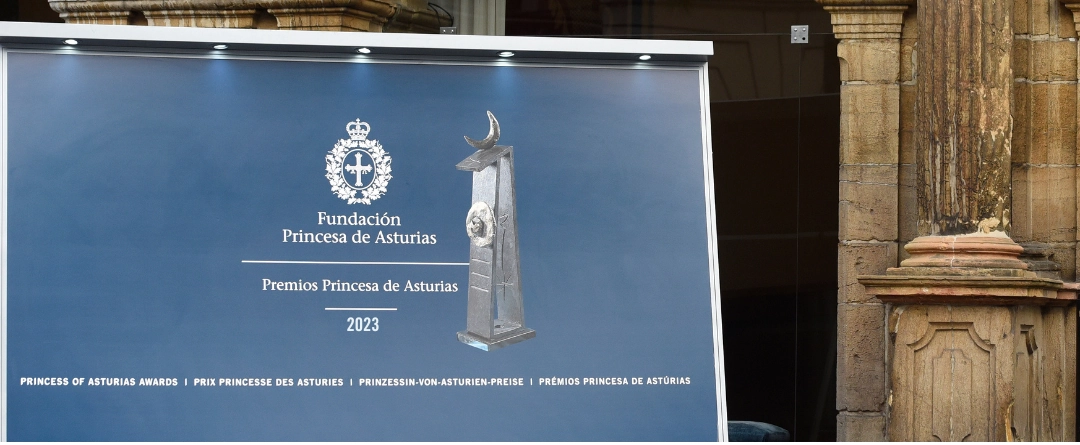Main content
Press releases
Press conference and arrival schedule of the laureates in Asturias
Jeffrey Gordon will not be able to attend the ceremony following the recent death of his wife.

The 2023 Princess of Asturias Laureates will begin to arrive in Asturias on 16th October for the Awards Ceremony, which will be held at the Campoamor Theatre in Oviedo on Friday 20th October.
Bonnie L. Bassler and Peter Greenberg, joint Princess of Asturias Laureates for Technical and Scientific Research, and Haruki Murakami, Princess of Asturias Laureate for Literature, will be the first to arrive in the Principality.
The late Hélène Carrère d’Encausse, Princess of Asturias Laureate for Social Sciences, will be represented at the Awards Ceremony by her son Emmanuel Carrère, 2021 Princess of Asturias Laureate for Literature. The late Nuccio Ordine, Princess of Asturias Laureate for Communication and Humanities, will be represented at the ceremony by his partner, Rosalia Broccolo, and his sister, Maria Ordine.
Jeffrey Gordon will not be able to attend the ceremony following the recent death of his wife.
Besides featuring in different cultural events throughout the week, this year’s Laureates will hold several meetings with the press, as detailed below.
INFORMATION OF INTEREST:
Schedule subject to change. Updated information at: www.fpa.es/en.
- All press conferences will be held in the Reconquista Hotel’s screening room (“Salón de Proyecciones”), the entrance to which is in Calle Arquitecto Reguera.
- Graphic material on the arrival of the Laureates will be available in the Online Press Room (OPR) on the Foundation’s website: www.fpa.es/en.
- The biographies of Kavita Singh and Juliana Quintero (from the Drugs for Neglected Diseases initiative), Princess of Asturias Awards for International Cooperation and Amina Iddy Swedi and Panji Chipson Kajani (from Mary’s Meals), Princess fo Asturias Award for Concord are available in the Online Press Room (OPR).
MONDAY 16th OCTOBER
- Bonnie L. Bassler, joint Princess of Asturias Laureate for Technical and Scientific Research, will get to Oviedo at 1:15pm. .
- Peter Greenberg, joint Princess of Asturias Laureate for Technical and Scientific Research, is scheduled to arrive at 5:40pm.
- Haruki Murakami, Princess of Asturias Laureate for Literature, will get to the Hotel at around 6:00pm.
TUESDAY 17th OCTOBER
- Luis Pizarro, Executive Director of the Drugs for Neglected Diseases initiative (DNDi), Princess of Asturias Award for International Cooperation, is scheduled to arrive at 1:30pm.
WENESDAY 18th OCTOBER
- The official reception for Meryl Streep, Princess of Asturias Laureate for the Arts, will be at 10:50am.
- Rosalia Broccolo and Maria Ordine, partner and sister, respectively, of the late Nuccio Ordine, Princess of Asturias Laureate for Communication and Humanities, will arrive at 2:10pm.
THURSDAY 19th OCTOBER
- The official reception for Elisabeth Alexandra zu Löwenstein, President of Mary's Meals Spain, Amina Iddy Swedi, director in Kenya, and Panji Chipson Kajani, director in Zambia, on behalf of Mary's Meals, Princess of Asturias Award for Concord, will be at 9:50am.
- Marie-Paule Kieny, Chair of the Board of DNDi, Princess of Asturias Award for International Cooperation, is scheduled to arrive at 1:30pm.
- Eliud Kipchoge, Princess of Asturias Laureate for Sports, will arrive at the Reconquista Hotel around 5:10pm.
FRIDAY 20th OCTOBER
- Emmanuel Carrère, 2021 Princess of Asturias Laureate for Literature and son of the late Hélène Carrère d’Encausse, Princess of Asturias Laureate for Social Sciences, will arrive at around 12:50pm.
TUESDAY 17th OCTOBER
- 4:00pm. Bonnie L. Bassler and Peter Greenberg, joint Princess of Asturias Laureates for Technical and Scientific Research.
WEDNESDAY 18th OCTOBER
- 4:00pm. The Drugs for Neglected Diseases initiative, Princess of Asturias Award for International Cooperation. Luis Pizarro, executive director of DNDi, who will be accompanied by Kavita Singh, director of the organization in South Asia, and Juliana Quintero, researcher in Colombia on the Programme for the Study and Control of Neglected Diseases (PECET).
THURSDAY 19th OCTOBER
- 10:00am. Mary’s Meals, Princess of Asturias Award for Concord. Felicity Read, Director of Communications, Amina Iddy Swedi,organization’s director in Kenya, and Panji Chipson Kajani, its director in Zambia.
FRIDAY 20th OCTOBER
- 9:15am. Eliud Kipchoge, Princess of Asturias Laureate for Sports.
End of main content
